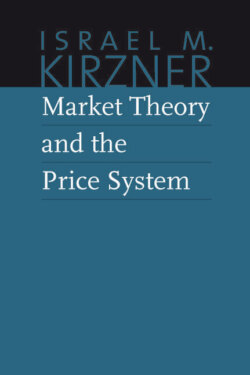Читать книгу Market Theory and the Price System - Israel M. Kirzner - Страница 37
На сайте Литреса книга снята с продажи.
THE COORDINATING FUNCTION OF PROFITS IN A MARKET ECONOMY
ОглавлениеIn the previous sections it was seen that the market process simultaneously solves the three fundamental problems of economic coordination through the price system. The emergence of a price structure reflects a priority system that guides resources to (what this priority system pronounces to be) their most productive uses. But the price system is not “automatic”; it functions only as the expression of human actions. In particular the price system is the expression of entrepreneurial decisions consciously planned and executed. Entrepreneurial decisions are made with the purpose of winning profits.
Profits are to be won whenever something can be sold for a price higher than the price it can be bought at (or higher than the sum of the prices of everything needed for its production). For an entrepreneur to win profits it is necessary, first, that such a price discrepancy exist; and second, that the entrepreneur know that it exists. Now, for a price discrepancy to exist, it is necessary that those willing to sell the commodity (or the factors necessary for its production) for the lower price and those willing to buy the commodity at the higher price be unaware of each other’s attitudes. If these sellers and buyers knew each other’s attitudes, these would soon be altered to eliminate the price discrepancy. The entrepreneur wins profits by becoming aware, earlier than others, of the hitherto unknown discrepancy (reflected in the price differential) between the attitudes of those willing to sell for less and of those willing to buy for more.
It is the characteristic of the real world to which the analysis of market theory may be applied that, at any one time, numerous instances occur of the kind of ignorance that makes it possible for price discrepancies and profits to emerge. Each market participant knows some of the market facts relevant to his own situation, but is ignorant of a great many more. Among the alternatives from which Market Participant A believes he has to choose, some particularly attractive alternative is usually missing (obtainable by dealing with Market Participant B) which might have been included if only A and B would have known of each other’s situation and attitude. From the point of view of an imaginary, disinterested outsider knowing all these facts, both A and B are the losers due to their ignorance of some market facts. From the point of view of the omniscient outsider, the market always has room for a reshuffling of resources or goods according to the pattern that would take place if the market participants themselves were not in ignorance of the opportunities available to them.
It is here that we can see the essential character of the coordinating functions performed by the market process. The market process tends to present market participants with alternatives that approximate those opportunities they would choose if they possessed all the relevant information. The market process achieves this without making it necessary for market participants to learn all this detailed information. Instead, the market reveals any lack of coordination resulting from ignorance by market participants of potentially available opportunities through the emergence of price discrepancies. Ignorance of available opportunities then equates to ignorance of price discrepancies. Where this kind of ignorance persists, the opportunity exists for the first discoverers of the price discrepancy to step in and win profits. In doing this they wipe out the price discrepancy itself, and thus remove the lack of coordination that resulted from the limited market knowledge of market participants.
The quest for profits thus serves as a complete substitute for the search for conditions where ignorance exists on the part of market participants of the opportunities available to them. In the quest for profits the latter search has been replaced by a simple search for price discrepancies. Wherever discrepancies exist between prices paid for identical goods, or between prices paid for goods and those paid for everything required for their production, then the imaginary omniscient economist could point out possibilities for reallocation of goods or resources that would benefit all concerned. The market tends to act to achieve precisely this reallocation by offering prizes (profits) for the detection and removal of price discrepancies. It is thus the activity of the entrepreneur in his search for profits that serves as the driving force of the price system, enabling it to solve the problems of coordination outlined in the previous sections of this chapter.
